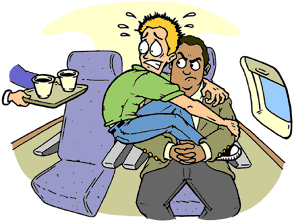Nervous About Flying?
 If this is you, don’t worry – you are not alone! Fear of flying is a very common phobia and can affect just about anyone. It is thought that around 17% of us have a flying phobia so severe that we will actually avoid flying to some extent.. In the UK, this means that more than 10 million of us avoid flying to some degree because of their fear! Another 25-30% of us may manage to fly, but are anxious when we do so.*
If this is you, don’t worry – you are not alone! Fear of flying is a very common phobia and can affect just about anyone. It is thought that around 17% of us have a flying phobia so severe that we will actually avoid flying to some extent.. In the UK, this means that more than 10 million of us avoid flying to some degree because of their fear! Another 25-30% of us may manage to fly, but are anxious when we do so.*
There are two categories of Nervous Flyers: those who are scared about issues to do with the plane (eg will it crash?) and those who fear their own reactions to flying (will I have a panic attack?). Actually, there is a third kind: those who fear both! For many, lack of control is a big factor in their fear – being unable to control the aircraft, unable to get out if they want, unable to control their comfort levels etc. This is why more people are afraid of flying than they are of driving – even though flying is far, far safer.
The good news is that fear of flying can be overcome. Most airlines run their own courses to help nervous flyers and these usually include a short flight at the end. However, they are expensive (around £200) and the special flight, full of nervous flyers and specially trained crew, is simply not the same as an ordinary flight. Cheaper options are self-help books and there are many good ones on the market (see list at end). Some private psychotherapists offer fear of flying one-to-one therapy for flying phobias or, occasionally, group courses (which can be a much cheaper option).
Any attempt to overcome phobias should incorporate three elements: knowledge, psycho-education and anxiety-coping skill training. This applies to any fear and in the case of a flying phobia, the knowledge part would refer to in-depth information about the mechanism of flying (can a plane withstand turbulence? Can wings fall off? What happens if an engine fails? etc), the psycho-education would cover the mechanics of the human body (what happens if I have a panic attack? Will I lose control? Start screaming? Will I collapse and die mid-air?) and the anxiety-coping skill training might include Progressive Muscle Relaxation Therapy and/or self-hypnotic techniques.
So, don’t limit your world by letting fear of flying take over. There is a huge range of help out there according to your budget, severity of phobia and personal preference. Maybe you want to book a summer holiday in the sun, visit family overseas or attend a work conference. Let 2014 be the year you make this happen!
* Stats taken from an excellent book on ‘fear of flying’; Overcome your fear of flying by Prof Robert Bor, Dr Carina Eriksen and Margaret Oakes.
Other good books are:
Fly without Fear by Captain Keith Godfrey and Dr Alison Smith:
Overcome your fear of flying by Prof Robert Bor, Dr Carina Eriksen and Margaret Oakes







A very good summary article. It’s interesting how the “fear of flying” taps into so many of our basic fears all at once. Perhaps that’s why so many people suffer from it to some degree.
Neil
PhooeyToFear.com
I’m not sure it “taps into many of our basic fears”. I think it works like all the anxieties and all those things like thinking about wings falling down are working like a trigger to start this phobia at that particular moment…
I was thinking of fear of heights, fear of death, fear of injury, fear of social embarassment, claustrophobia, fear of terrorism… there are a myriad of “basic fears” covered by “fear of flying”.
Neil.
The point is that flying phobias are about so many different issues – I think this is what makes it so complex. The wings thing – even if we educate fearful flyers about wings (apparently, there is as little chance of a wing falling off during turbulence as there is your arm falling off during a gale) this doesn’t seem to stop the fear for most. If only it were that easy!